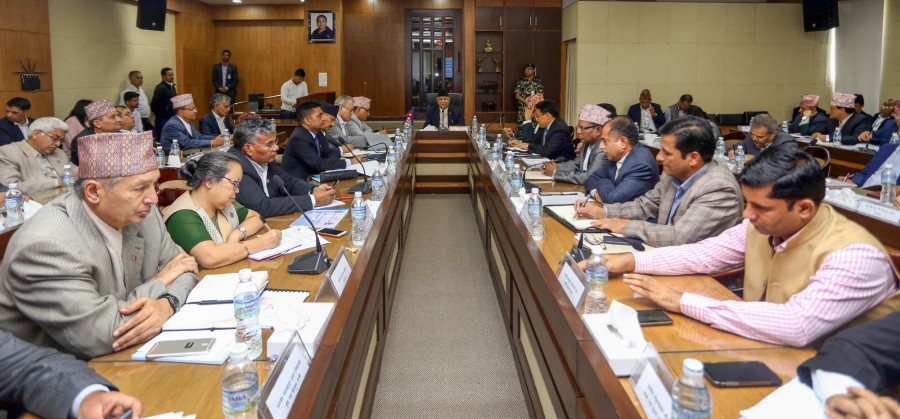Politics
Ministers from Maoist camp are uneasy with prime minister’s intervention in appointments, aides say
Several officials at line ministries say ministers have no freedom in appointing people and the secretaries report directly to Oli, hindering efficiency and results.
Tika R Pradhan
KP Sharma Oli might have changed his working style within the party but when it comes to his administration, the prime minister still exercises a firm hand, according to Oli’s Cabinet ministers.
Oli’s hand on the reins is particularly strong for ministers from the former Maoist party, advisors to a number of sitting ministers told the Post.
At least six openings at the Ministry of Agriculture and Livestock Development have been vacant for months despite Chakrapani Khanal, who heads the ministry, proposing names for the positions months ago.
“It’s been more than six months that the ministry forwarded three names to the Cabinet for chief of the Cotton Development Committee. We don’t know why the Prime Minister’s Office has not approved any one of the names,” said one official at the ministry. “The minister wanted anyone from among the three but the appointment has been unnecessarily delayed.”
Khanal has had it with prime minister’s micromanagement, the official said. All ministry officials and aides asked the Post that they not be named because they feared retribution.
Forest and Environment Minister Shakti Basnet is also facing difficulties with appointments of officers, as the prime minister’s advisors keep interfering in his affairs, an aide to the minister told the Post. A number of secretaries at the ministries report to Oli’s chief advisor Bishnu Rimal, who in turn briefs the prime minister, he said.
“How can ministers work with their secretaries when they report directly to the prime minister?” said a sitting minister on condition of anonymity.
At the Ministry of Water Supplies, Minister Bina Magar has been facing difficulties working with a secretary personally chosen by the prime minister, according to officials in the minister’s secretariat. Since the Kathmandu Upatyaka Khanepani Limited had not been performing well, the minister wanted changes in its leadership, but the Prime Minister’s Office intervened and put a stop to any changes, the officials said.
However, Magar herself has come under criticism recently for her handling of the Melamchi Water Supply Project, which has stalled for nearly a year. It’s unclear whether the prime minister’s intervention was linked to her inability to move the crucial water supply project to conclusion.
A central committee member who has close relations with Dahal categorically claimed that most former Maoist ministers have been facing problems, but they are in no position to speak out.
“When we talk with the ministers in private, they express their woes but they cannot say the same thing in public,” said the central committee member. “Some influential ministers, however, are trying to convince the prime minister to ensure that their proposals are endorsed by the Cabinet.”
Several leaders that the Post spoke to said that it was not only former Maoist ministers but also some from the former UML with complaints over Oli’s heavy-handed leadership style, especially when it came to appointments in their ministries.
“With a two-thirds majority [in Parliament] for the government, Oli’s behaviour, according to sitting ministers, has drastically changed,” said one former minister.
Kundan Aryal, the prime minister’s press advisor, confirmed that no appointments are endorsed without the prime minister’s consent. As co-chair of the ruling Nepal Communist Party (NCP), Oli has all the right to make decisions over appointments and oversee his Cabinet minister, said Aryal.
“There is some confusion because we come from a culture of coalition governments with different parties in government,” he said. “But in a ruling party, ministers do not have autonomy in appointments.”
Aryal further said that scrutiny was essential, because there had been controversy over some appointments.
“Appointments are also linked with the government’s image,” he said.
A Nepal Communist Party (NCP) leader, who has worked as a personal assistant to three ministers in various governments, said that former prime ministers Girija Prasad Koirala and Pushpa Kamal Dahal would give their ministers a free hand. They were also easily accessible to their ministers and would encourage them to perform better.
“But Oli has an exactly opposite nature,” said the leader. “Ministers cannot meet the prime minister when necessary, but he interferes in their work. He doesn’t even behave as he should with the ministers during Cabinet meetings.”
“Sometimes it may take several hours for the prime minister to manage time for a meeting,” said Jivan Gautam, advisor to Education Minister Giriraj Mani Pokhrel. “I don’t think senior ministers like Pokhrel and Barsha Man Pun have any difficulties in the Oli cabinet.”
However, Rekha Sharma, a former minister in the previous Oli administration, said that she had experienced no difficulties during her time in the Oli Cabinet. But ministers and the prime minister must always work in coordination with each other, she said.
***
What do you think?
Dear reader, we’d like to hear from you. We regularly publish letters to the editor on contemporary issues or direct responses to something the Post has recently published. Please send your letters to [email protected] with "Letter to the Editor" in the subject line. Please include your name, location, and a contact address so one of our editors can reach out to you.




 16.12°C Kathmandu
16.12°C Kathmandu














